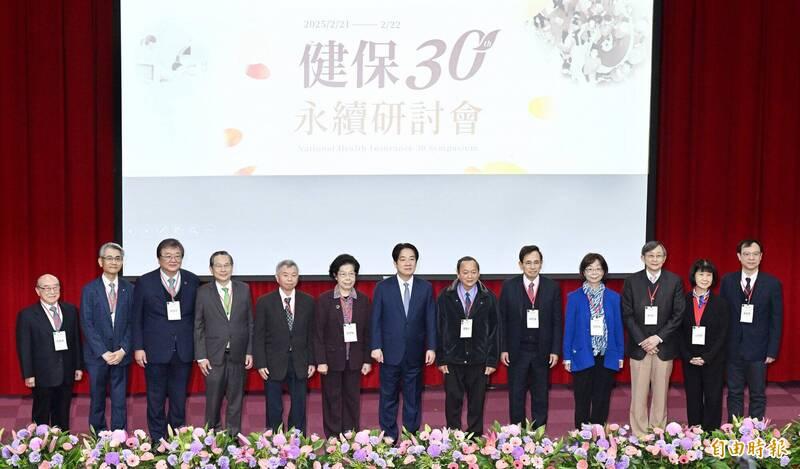President William Lai (賴清德) this morning attended a symposium to mark the 30-year anniversary of Taiwan’s world-acclaimed National Health Insurance (NHI) system.
In a forum on NHI sustainability, Lai expressed Taiwan’s deep gratitude to the NHI for safeguarding the health of all citizens.
He also stressed the importance of social health insurance as a social payback system to pool resources for those in need.

Photo: Liao Chen-huei, Taipei Times
Last year, Taiwan’s healthcare index was ranked first in the world for the sixth consecutive year, attracting recognition and praise worldwide, Lai said.
The NHI currently boasts medical coverage of 98 to 99 percent, one of the world’s highest, treating prisoners, military personnel and impoverished families, he added.
From the common cold to organ transplants, cancer treatment to hospice and palliative care, everyone in Taiwan receives the same level of service, he said.
The NHI system also has a public satisfaction rate of more than 90 percent, one of the highest approval rates worldwide, he said.
It has addressed problems across society, including the poverty trap of sick people becoming poor, and poor people becoming sick due to the cost of healthcare, Lai added.
The NHI is a non-partisan system established by forward-thinking leaders such as former president Lee Teng-hui (李登輝) and then-Department of Health minister Chang Po-ya (張博雅), he said.
However, the NHI faces some challenges, such as a shortage of medical personnel, particularly in the fields of internal medicine, surgery, pediatrics, and obstetrics and gynecology, he said, calling for these challenges to be addressed through healthcare reforms to ensure the NHI continues to deliver world-class service.

Taiwan is stepping up plans to create self-sufficient supply chains for combat drones and increase foreign orders from the US to counter China’s numerical superiority, a defense official said on Saturday. Commenting on condition of anonymity, the official said the nation’s armed forces are in agreement with US Admiral Samuel Paparo’s assessment that Taiwan’s military must be prepared to turn the nation’s waters into a “hellscape” for the Chinese People’s Liberation Army (PLA). Paparo, the commander of the US Indo-Pacific Command, reiterated the concept during a Congressional hearing in Washington on Wednesday. He first coined the term in a security conference last

Prosecutors today declined to say who was questioned regarding alleged forgery on petitions to recall Democratic Progressive Party (DPP) legislators, after Chinese-language media earlier reported that members of the Chinese Nationalist Party (KMT) Youth League were brought in for questioning. The Ministry of Justice Investigation Bureau confirmed that two people had been questioned, but did not disclose any further information about the ongoing investigation. KMT Youth League members Lee Hsiao-liang (李孝亮) and Liu Szu-yin (劉思吟) — who are leading the effort to recall DPP caucus chief executive Rosalia Wu (吳思瑤) and Legislator Wu Pei-yi (吳沛憶) — both posted on Facebook saying: “I

Sung Chien-liang (宋建樑), who led efforts to recall Democratic Progressive Party (DPP) Legislator Lee Kun-cheng (李坤城), was released on bail of NT$80,000 today amid outcry over his decision to wear a Nazi armband to questioning the night before. Sung arrived at the New Taipei District Prosecutors’ Office for questioning in a recall petition forgery case last night wearing a red armband bearing a swastika, carrying a copy of Adolf Hitler’s Mein Kampf and giving a Nazi salute. Sung left the building at 1:15am without the armband and covering the book with his coat. Lee said today that this is a serious

A mountain blaze that broke out yesterday morning in Yangmingshan National Park was put out after five hours, following multi agency efforts involving dozens of fire trucks and helicopter water drops. The fire might have been sparked by an air quality sensor operated by the National Center for High-Performance Computing, one of the national-level laboratories under the National Applied Research Laboratories, Yangmingshan National Park Headquarters said. The Taipei City Fire Department said the fire, which broke out at about 11am yesterday near the mountainous Xiaoyoukeng (小油坑) Recreation Area was extinguished at 4:32pm. It had initially dispatched 72 personnel in four command vehicles, 16